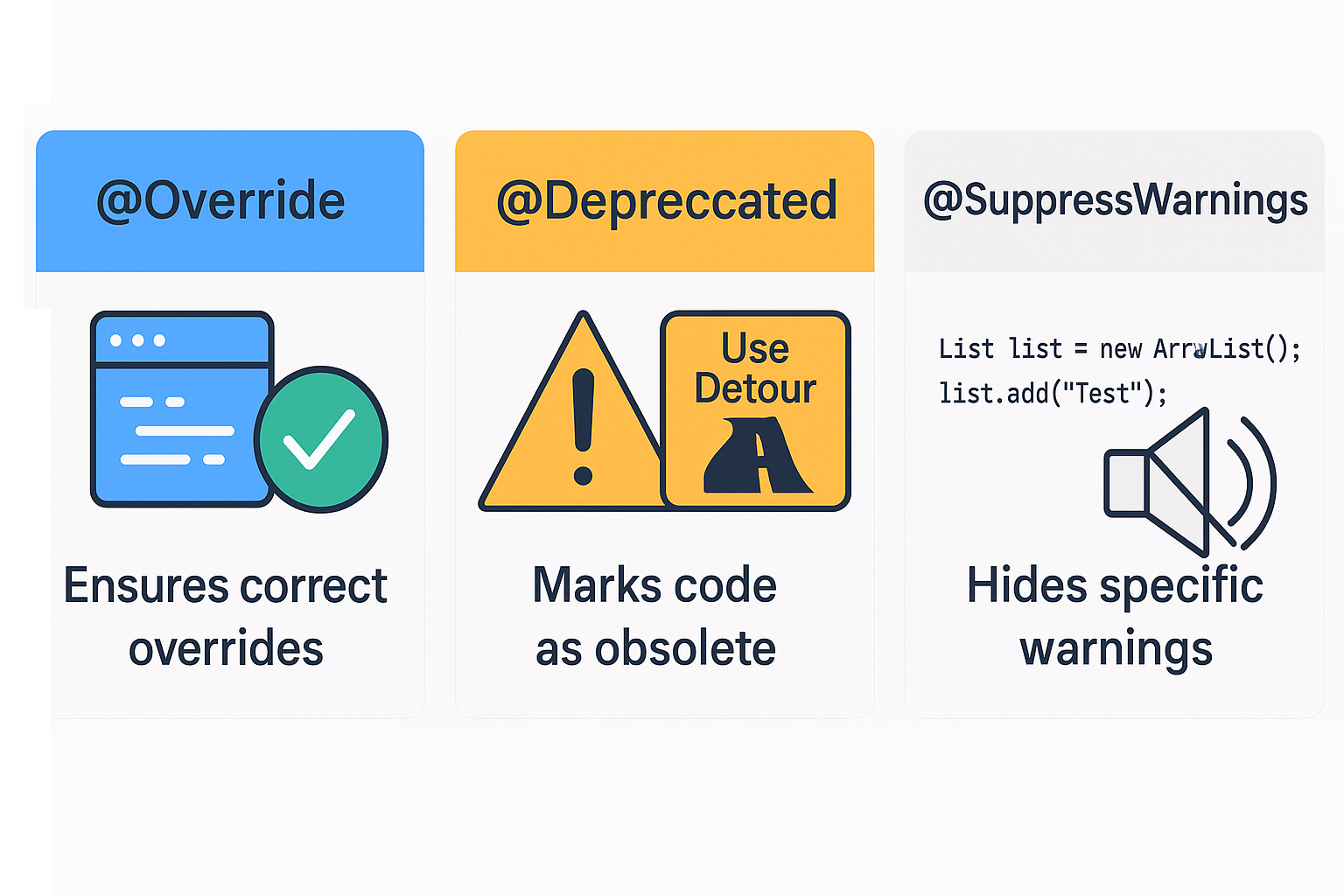Java annotations are metadata tags that provide additional information to the compiler and runtime without changing the actual code logic. In this tutorial, we’ll dive into three essential annotations: @Override, @Deprecated, and @SuppressWarnings.
📌 What are Java Annotations?
Annotations act like sticky notes in your code. They don't execute logic themselves but guide the compiler and tools about how to treat specific code elements.
- Why it matters: They improve readability, reduce errors, and enable tools like IDEs and frameworks to provide better support.
- When to use: Use annotations whenever you want to convey extra meaning to the compiler or document code behavior.
[Related: link-to-other-article]
🔹 @Override Annotation
✅ Core Concept
- Indicates that a method overrides a method from its superclass or implements a method from an interface.
- Helps catch errors during compilation if the method signature doesn’t match.
💻 Example:
class Parent {
void display() {
System.out.println("Parent display");
}
}
class Child extends Parent {
@Override
void display() {
System.out.println("Child display");
}
}
🔍 Common Mistake:
class Child extends Parent {
@Override
void dispaly() { // Typo: compiler error due to @Override
System.out.println("Child display");
}
}
Without @Override, this would silently create a new method instead of overriding, causing bugs.
📊 Use Case:
- Useful in large projects to prevent subtle method signature errors.
🚫 When to Avoid:
- Don’t use on methods that are not overriding anything.
🔹 @Deprecated Annotation
✅ Core Concept
Marks a class, method, or field as obsolete. The compiler issues a warning when used.
💻 Example:
class Legacy {
@Deprecated
void oldMethod() {
System.out.println("Use newMethod() instead.");
}
void newMethod() {
System.out.println("This is the new method.");
}
}
🔍 Real-World Analogy:
Think of it as a “Road Closed – Use Detour” sign in code.
📊 Use Case:
- When phasing out old APIs but still keeping backward compatibility.
🚫 Common Mistake:
- Deprecating without documentation. Always use
@Deprecatedwith@deprecatedJavadoc tag.
🔹 @SuppressWarnings Annotation
✅ Core Concept
Suppresses specific compiler warnings.
💻 Example:
@SuppressWarnings("unchecked")
void processList() {
List list = new ArrayList();
list.add("Test");
System.out.println(list.get(0));
}
📊 Use Case:
- Useful when dealing with legacy code or unavoidable unchecked operations.
🚫 Anti-pattern:
- Never use
@SuppressWarnings("all")blindly as it can hide real issues.
📈 Comparison Table
| Annotation | Purpose | Compiler Effect | Common Use Case |
|---|---|---|---|
| @Override | Ensure method overrides | Compile-time check | Prevent signature errors |
| @Deprecated | Mark code as obsolete | Warning during usage | Transition to new APIs |
| @SuppressWarnings | Hide specific compiler warnings | Warning suppressed | Legacy code compatibility |
🔧 Best Practices
- Always pair
@Deprecatedwith Javadoc explaining alternatives. - Use
@Overrideconsistently to catch typos early. - Use
@SuppressWarningssparingly and document why it’s used.
📚 Interview Questions
-
Q: What is the purpose of @Override?
A: Ensures a method actually overrides a parent method; catches signature mismatches. -
Q: Can you deprecate a class constructor?
A: Yes, you can annotate constructors with@Deprecated. -
Q: Is @SuppressWarnings retained at runtime?
A: No, it’s retained in source and class files but not available at runtime via reflection.
📌 Java Version Relevance
| Java Version | Change in Behavior |
|---|---|
| Java 5 | Introduced all three annotations |
| Java 6+ | @Override allowed on interface methods |
✅ Conclusion & Key Takeaways
- Annotations provide metadata that helps the compiler and tools.
@Overrideavoids subtle bugs,@Deprecatedhelps manage legacy code, and@SuppressWarningskeeps warnings under control.- Use them wisely and always document your intentions.
❓ FAQ
Q: Do annotations impact runtime performance?
A: Basic annotations like these do not impact performance; they are mainly compile-time hints.
Q: Can I create custom annotations?
A: Yes, Java supports custom annotations with @interface.
Q: Should I remove deprecated methods immediately?
A: Not always. Keep them until all dependent code migrates.
